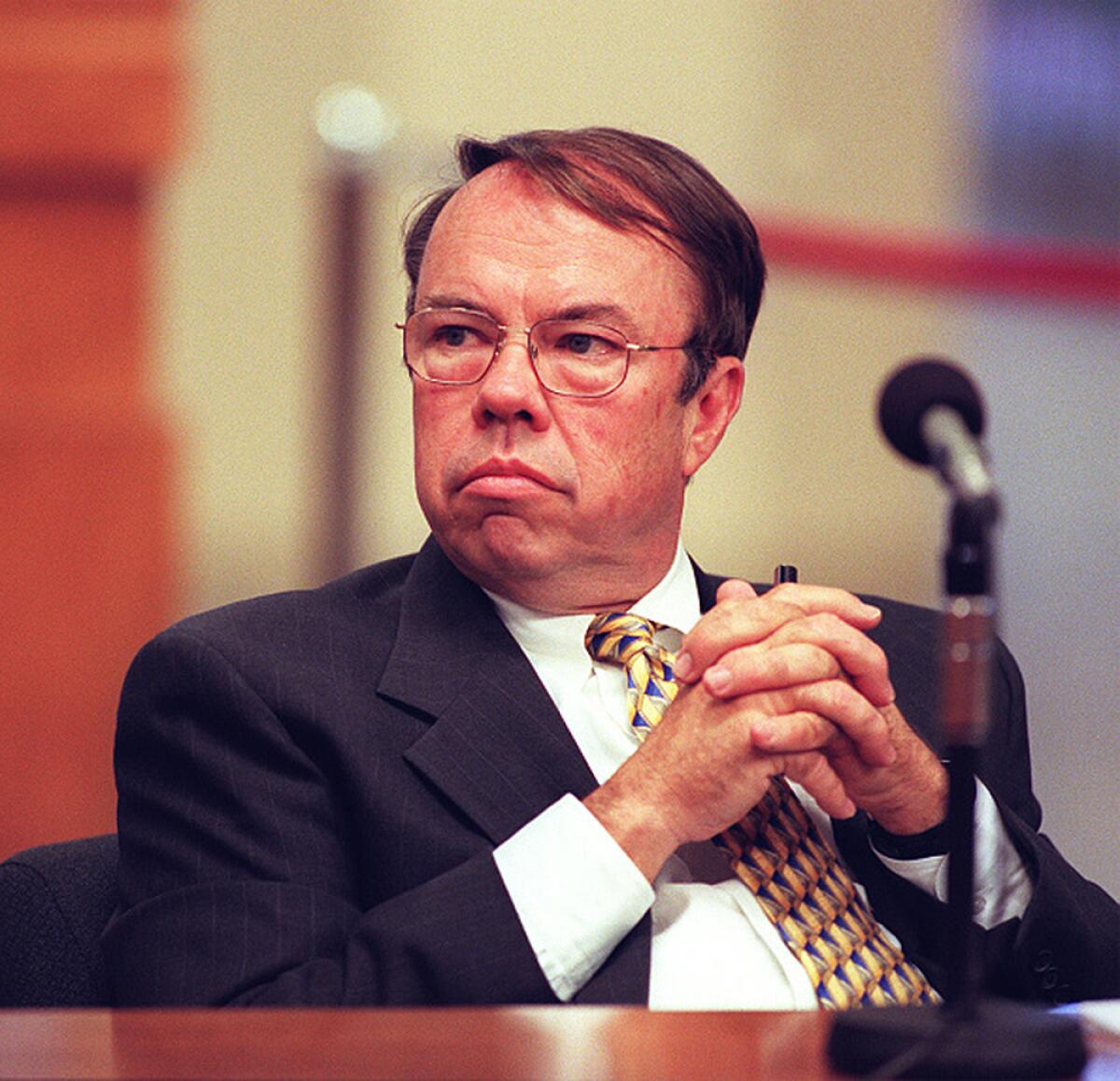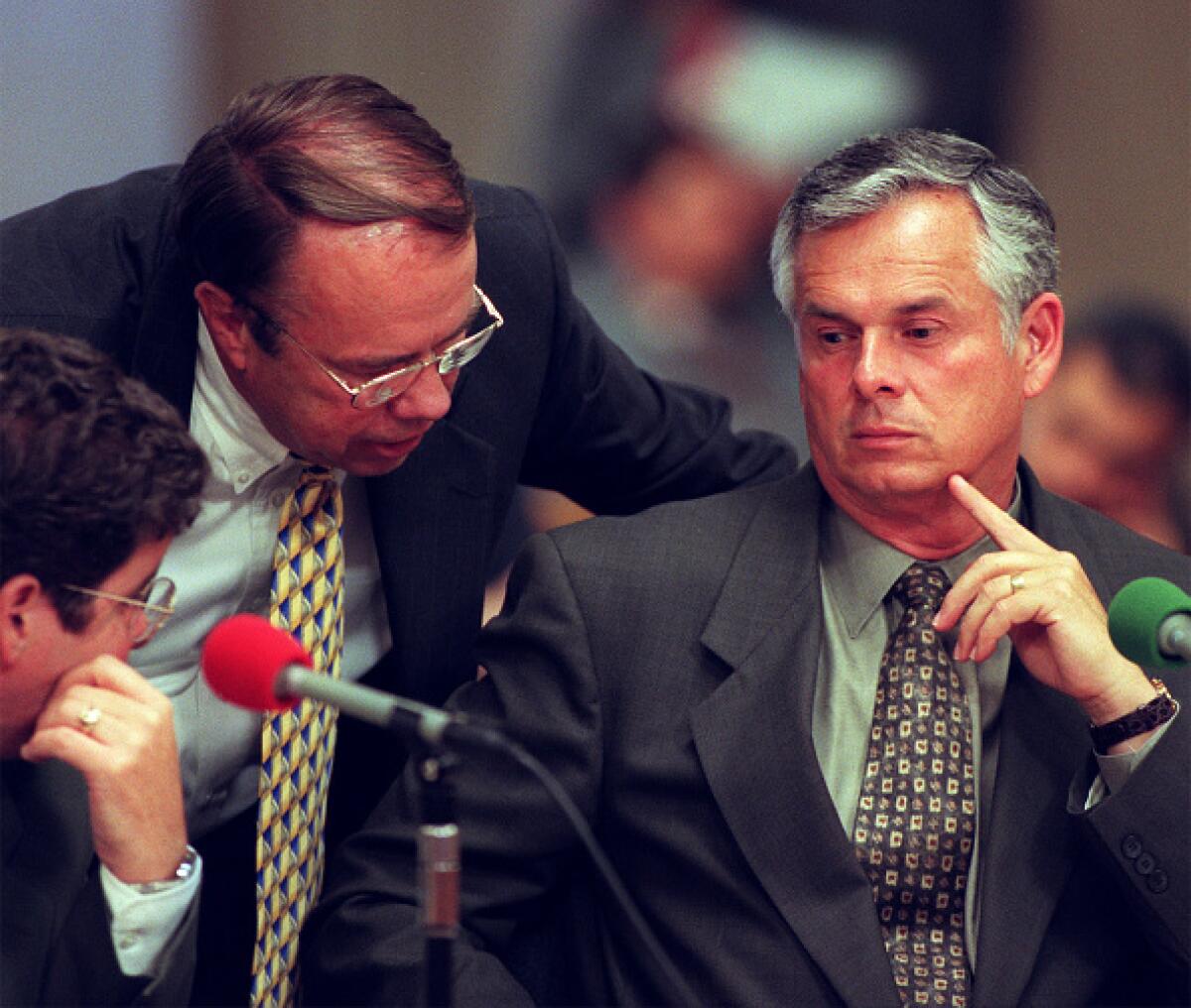Ron Deaton, influential advisor to the L.A. City Council, dies at 77

- Share via
He was the consummate behind the scenes player, advising and influencing the Los Angeles City Council on its most urgent issues while staying out of the public eye.
Ronald F. Deaton, the city’s chief legislative analyst from 1993 to 2004, offered his expertise as the council responded to the 1994 Northridge earthquake, dealt with the aftermath of major civil unrest and battled a years-long campaign to break up the city.
When the mayor and council were at odds, or council members weren’t speaking to each other, Deaton served as a valuable go-between, said Zev Yaroslavsky, who served on the council and later the county Board of Supervisors.
“People trusted him, because at the end of the day, he loved the city. He loved governance,” said Yaroslavsky, a longtime friend who is now director of the Los Angeles Initiative at the UCLA Luskin School of Public Affairs. “If you wanted to get something done, you went to him.”
Deaton died Tuesday after a prolonged illness at his home in Ensenada, Mexico, said his son David Deaton. He was 77.
A lifelong Republican working in a politically liberal city, Deaton logged more than 40 years inside L.A government. He spent three years running the Department of Water and Power, the agency where he started and finished his career.
Still, he wielded the greatest influence in the chief legislative analyst’s office, where he advised the 15-member council on ballot measures, public works projects and the protracted fight over whether the San Fernando Valley should secede from Los Angeles and become its own city.

Sometimes referred to as the “16th council member,” Deaton negotiated the terms of federal oversight of the Los Angeles Police Department. He helped craft the deal points for financing Staples Center, the arena that opened near the city’s Convention Center in 1999. And he advised council members as they sparred with secessionists over the language of a Valley breakaway ballot measure, which voters defeated in 2002.
Deaton also pushed for the $300-million seismic retrofit and restoration of City Hall, despite objections that the project was too expensive, said former City Councilwoman Cindy Miscikowski, who served on the council from 1997 to 2005.
“There were a lot of forces who said ‘Tear it down. It’s not economical. And we can do so much more with the land,’” Miscikowski told The Times in 2017. “Definitely, City Hall still stands because of Ron Deaton.”
Deaton was born in Long Beach on Jan. 12, 1943, to Nellie and Olon Deaton, who moved to Southern California from Arkansas during the Dust Bowl. After attending college, he took a job with the DWP in 1965.
He started in the utility’s sales department, promoting all-electric Gold Medallion homes, and quickly met Ellery Boyle, a typist and receptionist who worked on the same floor. The two began carpooling and were married in 1966.
Deaton eventually transferred out of the DWP and by 1976 was working in the chief legislative analyst’s office. He landed the department’s top job 17 years later.

While in that post, Deaton showed newly elected council members how the city worked and how they could be more effective, said Councilman Mike Hernandez, who represented neighborhoods such as Westlake, Chinatown and Lincoln Heights.
“Basically, he helped me become a better policy maker,” said Hernandez, who stepped down in 2001.
Deaton handled a long list of ballot measures that generated funds for new parks, libraries, animal shelters, police stations and zoo facilities. He also worked to ensure the city preserved some of its most significant landmarks, including Griffith Observatory, Van Nuys City Hall and Point Fermin Lighthouse in San Pedro.
Mayor Eric Garcetti, while serving on the council, worked with Deaton on a 2004 clean water bond measure, which provided funding to restore Echo Park Lake and other park land.
“The entire writing of it was something he taught me how to do,” Garcetti said. “He was a marvelous teacher. He knew when to give you a lecture, when to back off ... and he wasn’t too proud to learn new tricks.”
Deaton’s influence began to wane in the wake of term limits, with a new crop of city lawmakers taking office in 2001. Some felt Deaton was trying to dictate the outcome of key council decisions.
In 2004, he took the top job at the DWP. Deaton retired three years later, after suffering a cardiac arrhythmia during a trip to Costa Rica. Although he never sought or publicly showed any interest in running for office, his wife won a seat on the Seal Beach City Council in 2010.
Deaton is survived by his wife; his brother, Gary Deaton, and his wife Joy; his children David Deaton, Daniel Deaton, Deidre Davis and Dara Loftis, as well as their spouses, and 12 grandchildren.
More to Read
Start your day right
Sign up for Essential California for the L.A. Times biggest news, features and recommendations in your inbox six days a week.
You may occasionally receive promotional content from the Los Angeles Times.







